Ace Erasure and Internalized Ableism
I am autistic, and I am queer.
Discovering my queer identity has been a twenty-some year journey, fraught with internalized ableism, lack of representation, and internalized fatphobia/body negativity. Today I’d like to discuss the obstacles that prevented me from knowing I had a valid queer identity, in the hopes that other young people struggling with similar problems can find the answers they need, without having to spend a decade or more feeling like a weird, ugly, fat outsider who’s just too picky, despite being perfectly happy as a single pringle who does not wish to mingle.
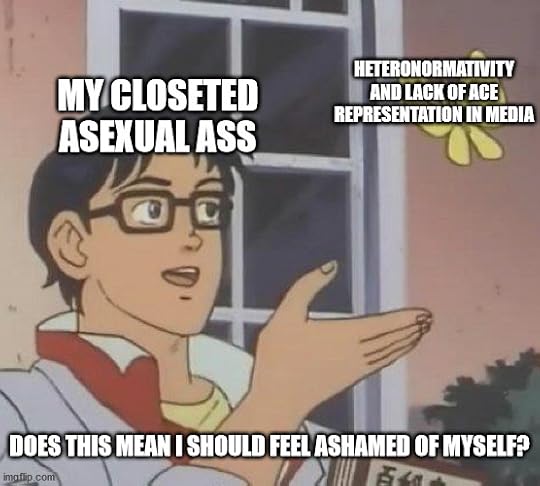
It started in Japan
Though I probably have been ace/acespec most of my life, my journey of actually realizing that I was asexual started when I was 25, when I had what I thought was a huuuge crush. Let me paint the picture for you:
It’s 2016. After a long bout of walking pneumonia and a rushed emergency dental procedure mere days before departure, I arrived in Japan to teach English. This is something I was looking forward to for years, ever since high school. Finally, it was Japan! I had no idea what was going on–I was severely jet-lagged and didn’t have a watch to be able to keep track of time during the three days I was at a hotel in Tokyo attending pointless panels with other hopeful English teachers. The panels all cover topics I’d already learned long ago in college–“How to introduce yourself in Japanese and make a good impression on your coworkers.” “How to use chopsticks” “How to go grocery shopping.” I was hoping to attend some intensive seminars about actually teaching, since that’s what we were here to do, but every panel was basically Japanese language and etiquette that’s asameshimae–a piece of cake, something I could do even before breakfast. So I daydreamed my jetlagged way through the panels until finally, on day four of being in the country, I was loaded onto a bus and sent off to Iwaki, a city right on the coast, smack dab in the middle of Fukushima prefecture. It was a perfect placement for me–beaches galore, a large population of foreign expats to be my friends, a great support network in case I needed help… Still jet-lagged, I boarded the bus to go to my new home, but along the way, between my bouts of nodding off, I noticed a young man on the opposite side of the aisle from me who had long blond hair tied back in a ponytail. He looks like Legolas! I thought. The orientation staff had given us all booklets with contact information: phone numbers for the Tokyo consulate and for our local BoE, as well as photos and short bios of all the other ALTs who would be traveling with us. By process of elimination and referencing this booklet, I I figured out his name.
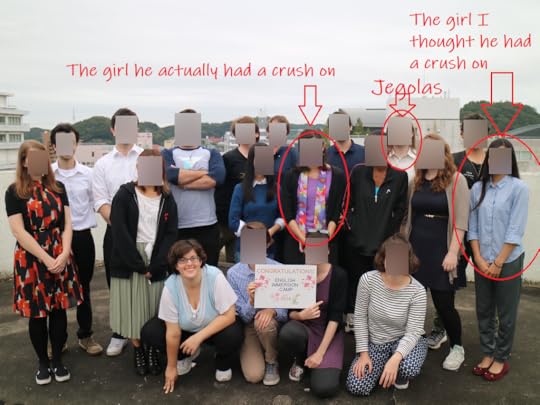
It starts with J, and while he was a bit of a douchebag, he wasn’t horrible enough to not deserve anonymity here, so for story’s sake, we’ll call him Jegolas. To this day, I have no doubt I had a teeny-tiny crush on Jegolas. But now, having learned about the split-attraction model, and about squishes, I also think it was a squish–a non-romantic, non-sexual infatuation with someone, just because he looked like Legolas. As I spent more time with him, I learned several things about him–we were going to be living in the same apartment building, and he would be teaching English at the middle school right across the street from my elementary school. My kids would graduate and go on to be his kids! This was a classic rom-com setup that I still to this day want to write as an actual book (of course, Jegolas’ character would be a lot nicer than his real-life counterpart lol). I also learned that even when I wore my most low-cut cute pink tank top to show off my cleavage and put on as much flirt as I could muster at Charisma skill level 1, he had zero interest in me. I later learned that he possibly had a crush on another English teacher in our apartment building, who was petite, Asian (Japanese-American by birth), with long hair and no glasses. The complete opposite from me! (Ironically, I no longer speak to Jegolas and our personalities clashed horribly during our two years living near each other, but the girl he supposedly had a crush on turned out to be one of my best friends while I was there!) Then I also learned a few other things about him: he didn’t have a crush on this girl, but another English teacher who lived a few stops over on the local train, who was also petite with long dark hair. (There was a lot of drama in that sense when I was in Japan; she was kind of creeped out by him, and since he was nicer to me, I turned myself into a sort of bodyguard for her when he tried to hit on her during group hangouts) He was also a conservative Republican (ew) and thought it was funny to jumpscare me on my way home from work and trigger my anxiety. Twice. (Seriously, does he not realize how actually CREEPY that was???) He also, at one point, spent an hour or so in our group chat defending Trump and calling Trump’s victims “gold diggers” and essentially denying that rape was even a real thing. My interest in him quickly faded.
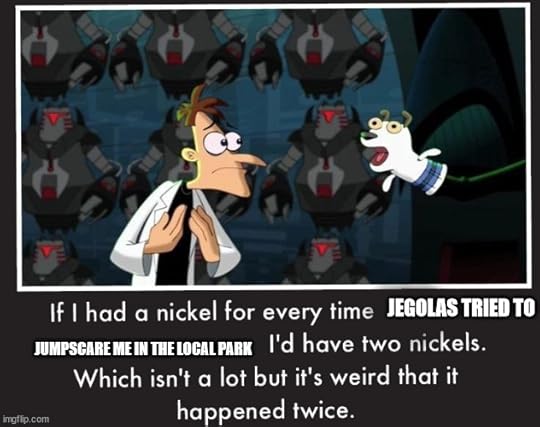
It was around the same time that I was crushing on Jegolas that I also discovered the term demisexuality thanks to one of my favorite Youtubers at the time coming out as demisexual.
What does being queer mean to me?
After I returned to California in 2018 and the aforementioned Youtuber came out on her channel, I briefly looked up the term demisexuality, but nowhere did I look did it mention that demisexuality was one identity on the asexuality spectrum. For a while, I was playing with the idea that I too was demisexual, but I was still not ready to apply that label to myself. After all, I’d grown up with several close guy friends, but I couldn’t imagine myself married to any of them. To me, the idea of “not marrying” was ridiculous. I didn’t want to get married, but I felt as if I had no other choice–I couldn’t see any other futures for myself because society pushes heteronormativity so much, and there was no media representation for “not being married as an adult.” So I just contented myself with the idea that once I found someone as sweet and handsome as Legolas, surely then I’d want to marry them.
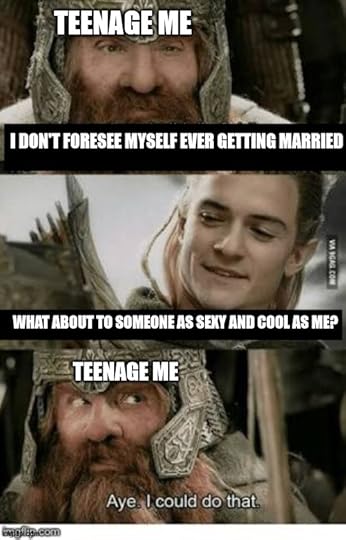
Up until the time the aforementioned Youtuber brought up her demisexuality, I’d never even entertained the possibility that I was queer. To me, being LGBTQ meant Lesbian (girls being attracted to girls), Gay (boys being attracted to boys), Bisexual (people of any gender being attracted to more than one gender), or Transgender (identifying as a different gender than the one you were assigned at birth). I knew I wasn’t attracted to women, but neither was I really attracted to men. I also was perfectly comfortable being a cisgender woman, and I knew I didn’t really fall under the “transgender” label. Asexuality is so invisible that I didn’t know my feelings, or lack thereof, were still valid. Even with the catch-all “queer/questioning” label, which was too vague to really mean anything to me, I couldn’t find my people. As you might be very well-aware, us autistic folks don’t do well with vague terms, and I never saw how my lack of attraction for anyone could possibly fit into any queer label. For years, I just told myself I was extremely picky and that someday I’d fall in love with my own Prince Legolas–sexy, heroic, who’d sweep me off my feet, who I’d marry in a fairytale-style wedding, and whose children I would someday bear. I’d never even heard of the asexual spectrum, nor did I have any inkling of the fact that my lack of attraction was just as valid as homosexuality or heterosexuality, or any other sexuality.
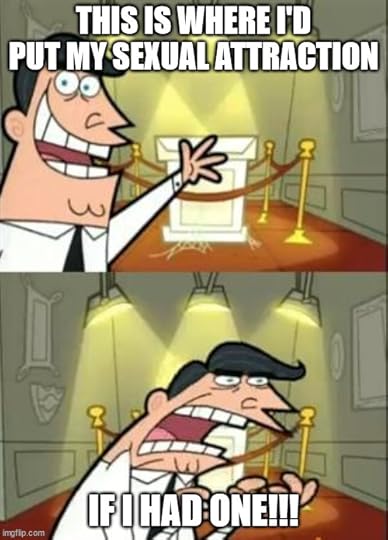
Internalized fatphobia and body negativity
By the time I hit middle school, I was already overweight, and I constantly struggled with eating and maintaining a healthy weight. Not to mention that I also have what could be considered a “homely” face and have never felt truly beautiful or worthy of love. I spent years telling myself such things as “no one will ever fall in love with you because you’re fat and ugly” and “you shouldn’t be so picky because your choices are limited, anyway.” Extremely self-deprecating, but they were easier to understand–I couldn’t put into words or even justify that I wanted something other than the norm because I couldn’t explain what I did want. I didn’t want kids, or to get married, but with TV, movies, books, and all other sorts of media pushing the idea that women never getting married or never having kids was shameful, I didn’t feel comfortable voicing my unorthodox wishes. After all, TV shows and movies are always poking fun at the idea of the “crazy cat lady,” and making fun of women who chose to never get married and instead adopt lots of cats (my ideal lifestyle). Finally, in my twenties, I started meeting various married couples who had decided to remain childless, and I reasoned that if I could just force myself to want to get married, I could convince my husband that we could be a childless couple, too.
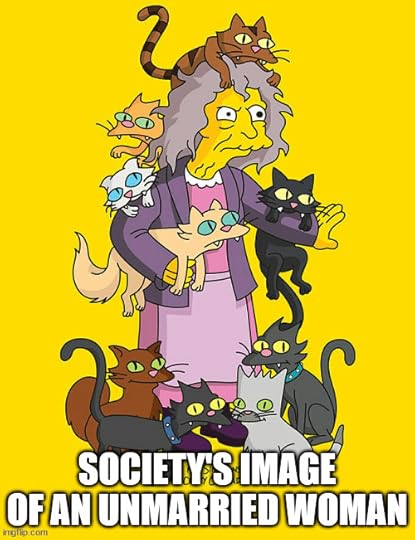
“Assume straight until proven otherwise”
Finally, in 2019, I discovered the term asexual. I thought it sounded a lot like me, but I didn’t want to apply the label to myself because I didn’t want to disrespect those who were ace. In short, I felt like I wasn’t “good enough” to be asexual because of my past crushes.
In ninth grade, I had my first squish, which at the time I confused for a crush. I had been cast as an extra in the school production of Hamlet (and later got upgraded to Gravedigger 2, a comic relief part that appears in one scene in a later act). As the only freshman in the production, I was a bit lonely, and I started crushing on the boy who played Osric–he was only one grade ahead of me, compared to the majority of cast who were juniors and seniors, and so I naturally gravitated toward him. But again, it was because he resembled a famous person from Lord of the Rings–in this case, Aragorn, but with lighter hair and no beard. It didn’t go anywhere, of course–at the end of my freshman year, I ended up transferring to another school, and I sent him a letter over summer break telling him how I felt, but it ended in rejection. (out of curiosity, a few years ago, I looked him up on Facebook and found that he now lives in New York, he graduated from NYU, and he’s in a band and has played in several successful gigs. He also looks completely different from how he did in high school and I would not have even glanced his way had he looked like that when I knew him, as he now gives off generic-white-guy syndrome.)
Of course, it was hard enough meeting guys when you were attending an all-girls’ private school, but even when my classmates would talk about actors they thought were “hot” or had a crush on, or what types of guys they were into, etc. I couldn’t relate. At the time, if I were asked, I’d just say I had a crush on Orlando Bloom, because he was a safe choice–he was conventionally attractive, and he played Legolas, and pretty much every straight girl under the sun had a crush on him anyway. I just always assumed that I was straight until proven otherwise–a curse that I’ve heard plagued many asexual people in their younger years.
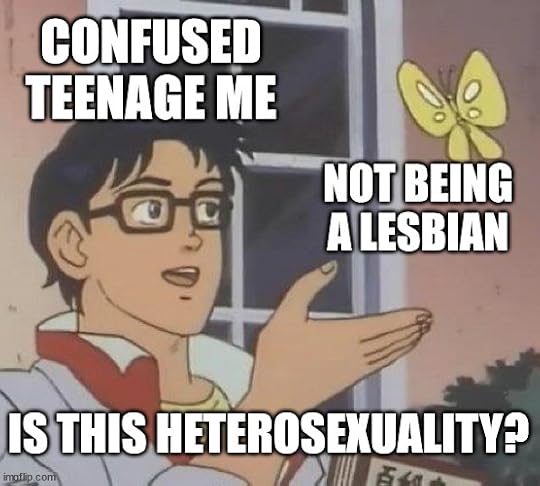
“Maybe you just haven’t met the right person yet”
This is a statement I’ve heard so many asexual people had to deal with when they disclosed that they were asexual. If I had discovered earlier that I was asexual/acespec, and come out as a teenager or in college, perhaps people would be saying this to me, too. Not to mention that I’m autistic, so there was always the added internalized ableism: that I’m asexual because I’m autistic, that my sensory issues would make sex extremely unpleasant to deal with, that my difficulty keeping friendships would also bleed into difficulty keeping a relationship going, that we autistics are already infantilized by the media and by general society and we’re seen as “sexless” for the most part so my coming out as asexual would only further that idea in people’s minds. And some may wonder what is even the point of me writing such a rambly, winding post full of anecdotes and memes. It is this…
ASEXUAL REPRESENTATION IS IMPORTANT, DON’TCHA KNOW
If I’d had more representation for asexuality before 2019, I would have avoided those years of self-doubt, of constantly questioning if I was “good enough” to be someone’s girlfriend, of being on the outside edges of society wondering why I couldn’t just be “normal.” To any teens/young people out there who are reading this post and find themselves identifying with any of the anecdotes I’ve shared about not ever “falling in love”, you are not alone. There is a label for that, and there are people like you out there. And especially to those people who think we’re just “attention seeking” or “special snowflakes” and question why every single book I write will and does have a prominent asexual/acespec character (usually the protagonist) it’s for kids like me who never found their people. I want them to find their people.
The TL;DR of this rambly post can be viewed very conveniently in this 1-minute Tiktok video I made a few years ago when I first came out during Pride month 2022:
@cmauthorHappy Pride everyone
♬ Kid Gorgeous in 1 Minute and 44 Seconds – JalonBrown#actuallyautistic #fyp #autism #autismawareness #neurodivergent #asexual #asexuality #asexualpride #asexualpride
Happy Rainbow Capitalism Month!
Corinne 乙女
TwitterInstagramGoodreadsYouTubeTikTok



